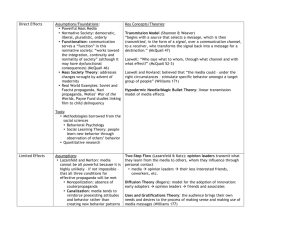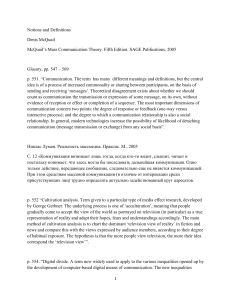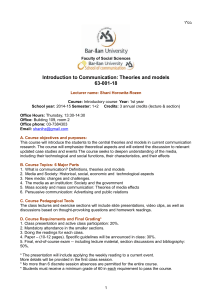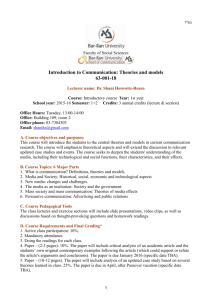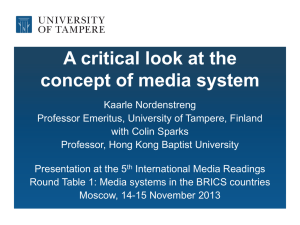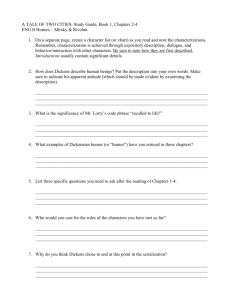Research Paper Assignment - University of Northern Iowa
advertisement
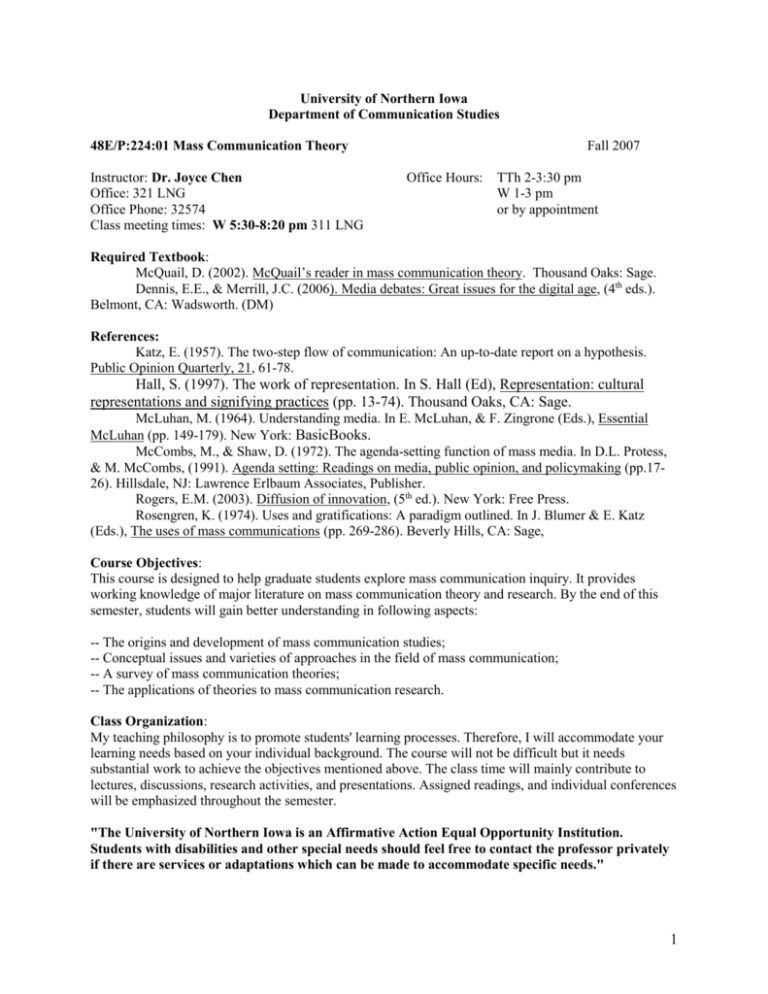
University of Northern Iowa Department of Communication Studies 48E/P:224:01 Mass Communication Theory Instructor: Dr. Joyce Chen Office: 321 LNG Office Phone: 32574 Class meeting times: W 5:30-8:20 pm 311 LNG Fall 2007 Office Hours: TTh 2-3:30 pm W 1-3 pm or by appointment Required Textbook: McQuail, D. (2002). McQuail’s reader in mass communication theory. Thousand Oaks: Sage. Dennis, E.E., & Merrill, J.C. (2006). Media debates: Great issues for the digital age, (4th eds.). Belmont, CA: Wadsworth. (DM) References: Katz, E. (1957). The two-step flow of communication: An up-to-date report on a hypothesis. Public Opinion Quarterly, 21, 61-78. Hall, S. (1997). The work of representation. In S. Hall (Ed), Representation: cultural representations and signifying practices (pp. 13-74). Thousand Oaks, CA: Sage. McLuhan, M. (1964). Understanding media. In E. McLuhan, & F. Zingrone (Eds.), Essential McLuhan (pp. 149-179). New York: BasicBooks. McCombs, M., & Shaw, D. (1972). The agenda-setting function of mass media. In D.L. Protess, & M. McCombs, (1991). Agenda setting: Readings on media, public opinion, and policymaking (pp.1726). Hillsdale, NJ: Lawrence Erlbaum Associates, Publisher. Rogers, E.M. (2003). Diffusion of innovation, (5th ed.). New York: Free Press. Rosengren, K. (1974). Uses and gratifications: A paradigm outlined. In J. Blumer & E. Katz (Eds.), The uses of mass communications (pp. 269-286). Beverly Hills, CA: Sage, Course Objectives: This course is designed to help graduate students explore mass communication inquiry. It provides working knowledge of major literature on mass communication theory and research. By the end of this semester, students will gain better understanding in following aspects: -- The origins and development of mass communication studies; -- Conceptual issues and varieties of approaches in the field of mass communication; -- A survey of mass communication theories; -- The applications of theories to mass communication research. Class Organization: My teaching philosophy is to promote students' learning processes. Therefore, I will accommodate your learning needs based on your individual background. The course will not be difficult but it needs substantial work to achieve the objectives mentioned above. The class time will mainly contribute to lectures, discussions, research activities, and presentations. Assigned readings, and individual conferences will be emphasized throughout the semester. "The University of Northern Iowa is an Affirmative Action Equal Opportunity Institution. Students with disabilities and other special needs should feel free to contact the professor privately if there are services or adaptations which can be made to accommodate specific needs." 1 Leading Discussion (15%): The leading discussion aims to help student gain better understanding of the materials provided in the textbook, and to promote class discussions. Each student will be responsible for presenting 2-3 of the chapters in the textbook and leading the class discussion. It is required to use the materials in the chapter as the basic content and to search additional up-to-date information about the mass communication studies. The detail requirements will be described in the handout for leading discussions. Response/Critique papers (15%) In addition to the leading discussion, you need to write three response papers that will demonstrate your understanding of the reading materials and critical thinking skills. The reading materials will be selected either from the textbooks or the reference articles/chapters. Attendance & Participation (10%): Because mass communication is related to your career and daily life, it needs your active participation in class discussions. You are expected to attend all the classes. The attendance/participation grade (10%) will be determined according to your attendance rate, active participation in class discussions and activities, and respectful listening to other students and the instructor. Research Paper (30%) & Presentation (10%): There will be one research paper (30%) and the final presentation of your research project (10%). The purpose of the research is to enhance your knowledge and analytical skills of mass communication, and demonstrate your competence applying mass communication theories to the analysis of mass communication issues. You will get a handout for the research paper and presentation. Quizzes (20%): There are two quizzes. The quiz questions will be given based on the materials in the textbook. There will be review guides and review sessions to help students prepare for the quizzes. Grading: All the work turned in to this class should be your original work for this class. According to University policy, plagiarism will result in FAILURE of the course and further DISCIPLINARY ACTION. Plagiarism includes "borrowing" other student's paper or other writer's work, and submitting the papers that you wrote for other courses. The grading composition is shown as follows: Attendance/Participation Response/Critique Papers Leading Discussion Quiz X 2 Research Paper Final Presentation TOTAL The letter grading scales are shown as follows: A: >95% B+: 88-91% C+: 77-79% A-: 92-94% B: 85-87% C: 74-76% B-: 80-84% C-: 70-73% 10% 15% 15% 20% 30% 10% 100% D+: 67-69% D: 64-66% D-: 60-63% F: < 60% The grades will be weighed by the percentages shown above and combined to result in your final course grade. Assignments are due at the beginning of class on the due date, unless otherwise stated. The penalty for a late assignment is 1 percent deduction for each day late. Any late assignment accepted 2 will be graded based on the reduced percentage. Before giving you the final grade I need to make sure that you achieve the objectives of this course. Tentative Schedule 8/22 Syllabus & Orientation Response paper #1 (Part I, McQuail) Leading Discussion Assignment 8/29 Discussion: Origins & development of mass communication studies Reading: Part I, McQuail Response paper #1 Due; Response paper #2 (select one chapter in Part II, McQuail) 9/5 Discussion: Conceptual issues & various approaches Reading: Part II, McQuail; Two-step flow (Katz) Response paper #2 Due; Response paper #3 (select chapters in McQuail) 9/12 Discussion: Mass media and society; Reading: Part III, McQuail; Representation (Hall); Chapters 5, 6, 7, & 8 (DM) 9/19 Discussion: Media; Reading: Part IV, McQuail; Understanding Media (McLuhan); Ch. 13&14 (DM) 9/26 Discussion: Normative theory Reading: Part V, McQuail; Agenda setting (McCombs & Shaw); Chapters 1, 2, & 3 (DM) Review for exam 10/3 Exam #1 Discussion: Global mass communication; Reading: Part VI, McQuail; Chapter 20 (DM) 10/10 Discussion: Media organization and production Reading: Part VII, McQuail; Diffusion of innovation (Rogers); Chapters 4, 9, 10, 11 & 12 (DM) Research Paper Assignment 10/17 Discussion: Media content; Research topic ideas; Sign up for individual meetings Reading: Part VIII, McQuail; Chapters 15-19 (DM) 10/24 Discussion: The media audience; Conceptualization of research ideas Reading: Part IX, McQuail; Uses & Gratifications (Rosengren) 10/31 Discussion: Mass media effects; Research methods; Reading: Part X, McQuail 11/7, 14 Individual meetings (introduction, literature review, research model & research questions) 11/21 11/28 Thanksgiving (No Class) Individual meetings (research methods, data collection, data analysis, discussion, & conclusion) 12/5 12/12(W) Class presentation Finals Week 5 - 6:50 pm, Final exam; Research Paper Due 3
